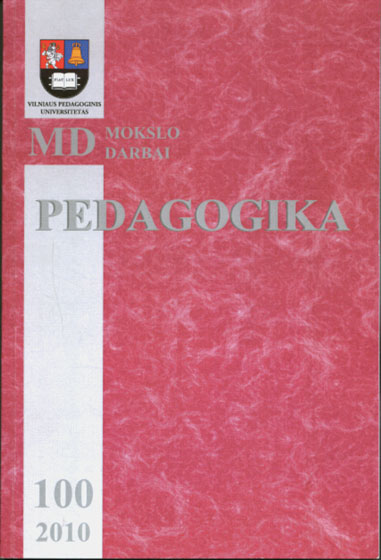Paauglių savęs vertinimo sklaida ir kaitos tendencijos reformuojamoje mokykloje
Spread of adolescents’ self-evaluation and change tendencies in school under reform
Author(s): Elvyda MartišauskienėSubject(s): Education
Published by: Vytauto Didžiojo Universitetas
Keywords: self-evaluation; attitude to behaviour of other people; spiritual values; education reform.
Summary/Abstract: Self-evaluations are considered to be an important part of education strategy of the reformed school which is based on holistic understanding of an individual and culture as well as on their intermingling and, thus, they are linked with embodiment of spiritual values. Adolescents’ self-evaluations according to the following criteria are positively changing and hierarchical system of self-evaluation is formed: the majority of adolescents provide stable evaluation of their own sensitivity to the beautiful and the individual as well as to dignity; they provide partially stable evaluations to honesty (faithfulness); least stable tendencies are observed evaluating altruism, responsibility (fulfilment of duties, non-compliance with negligence), solidarity (balance of interests). A different range of relevance of values to adolescents was identified. The most extensive range was observed in evaluations of honesty (speaking the truth 50 %, faithfulness 22 %) and partially in those of responsibility (responsibility for own actions 29 %), sensitivity (care for others 29 %) and dignity (22 %). The narrowest gap between acknowledgement of relevance of value and linking of own behaviour with it was established evaluating commitment to work (1 %), new discovery (1 %), non-compliance with negligence (2 %). Over the decade positive tendency was observed in the stability of evaluating adolescents’ sensitivity to the beautiful (16–14 %), faithfulness (16 %), sensitivity to people (14–13 %), spiritual unity (13 %), tolerance (12 %), creativity (11–11 %). Least considerable changes were revealed giving evaluation to altruism (commitment to work 2 %, self-devotion – 5 %), responsibility (fulfilment of duties and non-compliance with negligence – 4 %), solidarity (balance of interests – 5 %), honesty (speaking the truth – 6 %). Planning the strategy of education, the latter attitudes have to become the main concern of modern school.
Journal: Pedagogika
- Issue Year: 2010
- Issue No: 100
- Page Range: 64-71
- Page Count: 8
- Language: Lithuanian

